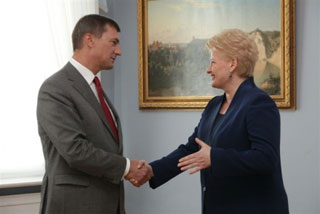Energy, Estonia, EU – Baltic States, Financial Services, Lithuania
International Internet Magazine. Baltic States news & analytics
Friday, 30.01.2026, 11:43
Lithuania and Estonia see energy independence of Baltic States as priority
 Print version
Print version |
|---|
| Andrus Ansip and Dalia Grybauskaite. Vilnius, 12.07.2010. |
"Energy independence of the Baltic states is one of the priorities of the entire European Union. In order to achieve it, the implementation of energy security projects in the region must be speeded up, giving them particular attention and financial assistance of the European Union," the Lithuanian President said.
According to the President, in order to eliminate the energy isolation of the Baltic States, it is necessary to promote energy diversification, reduce energy dependence on a single supplier and expand the integration of the Baltic Sea region market as well as ensure the development of power bridges between Lithuania, Latvia and Estonia.
President Grybauskaite and the Estonian Prime Minister discussed priority regional projects which would require financial assistance from the new EU budgetary perspective to be launched in 2014. Such projects would promote the development of power lines, high technologies, science and competitiveness in the Baltic States, the presidential press service reports BC.
Prime Minister of Estonia Andrus Ansip also met on Monday with his Lithuanian colleague Andrius Kubilius, President of Lithuania Dalia Grybauskaite and Speaker of the Seimas Irena Degutiene, reports the Government Press Office.
Besides bilateral co-operation, the discussions during meetings mostly involved economic matters and energy issues.
Ansip recognised the work done by the Government led by Kubilius in governing the country during the economic crisis.
“The developments in all three Baltic States have been very similar during the economic crisis and due to prompt reactions we all managed to decisively cut the public sector spending,” said the Estonian PM. He emphasised that Estonia did not cut State budget spending and carry out structural reforms not only for the purposes of adopting the euro, but to ensure the country’s sustainability, as did Lithuania and Latvia.
“The euro is naturally of great importance for Estonia, but a conservative fiscal policy is of even greater importance,” he noted.
When speaking about co-operation in the field of energy with his Lithuanian colleague, Ansip expressed his hope that the Nord Pool Spot pricing region would be applicable to Lithuania as well from January 2011. “Estonia is interested in creating a really functioning electricity market in the Baltic States as a part of the common electricity market with the Nordic countries,” he said.
Ansip and Kubilius also discussed the necessity of creating a digital internal market in the EU; the Estonian head of Government noted that its lack is hindering improving of EU’s competitiveness.
The importance of structural reforms was discussed at all three meetings. With the Speaker of the Seimas Irena Degutiene, Ansip talked about the urgent necessity to raise the pension age.
During his visit, Ansip placed a wreath on the grave of President Brazauskas and one on the foot of the monument erected in memory of those who had fallen in the name of Lithuania’s independence








 «The Baltic Course» Is Sold and Stays in Business!
«The Baltic Course» Is Sold and Stays in Business!

